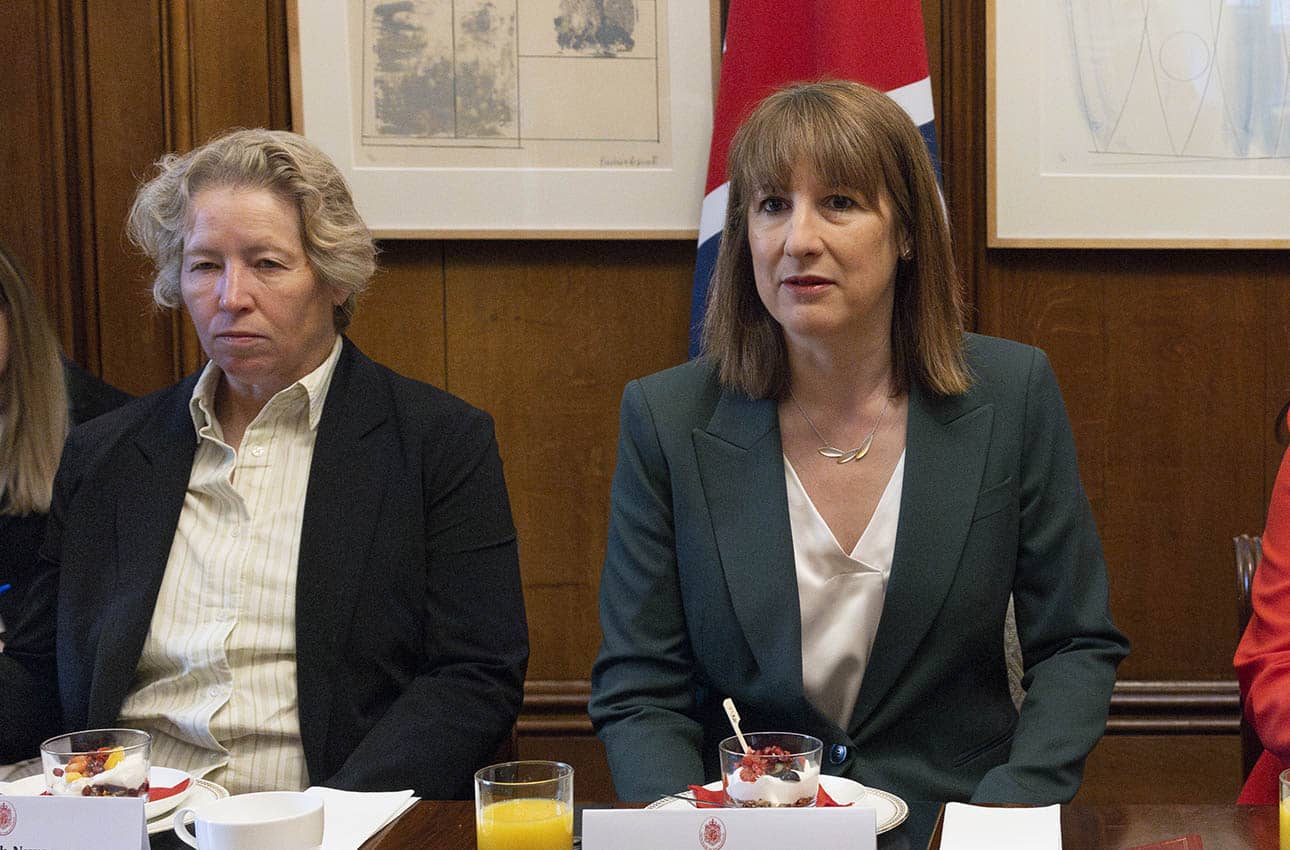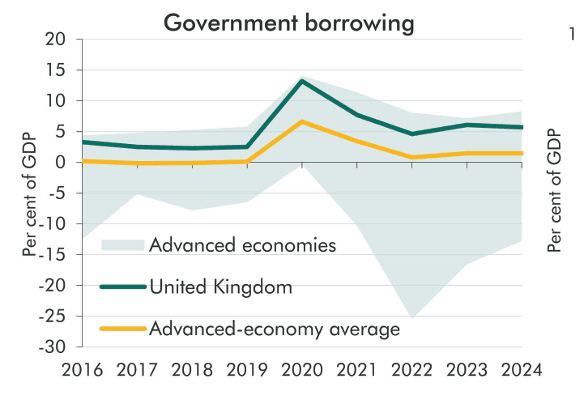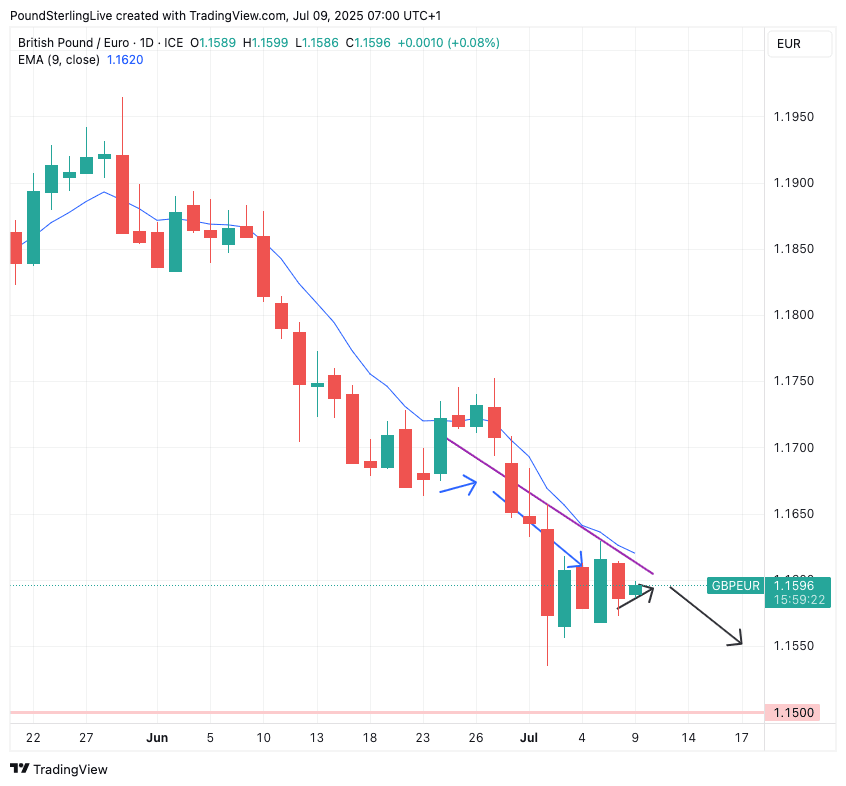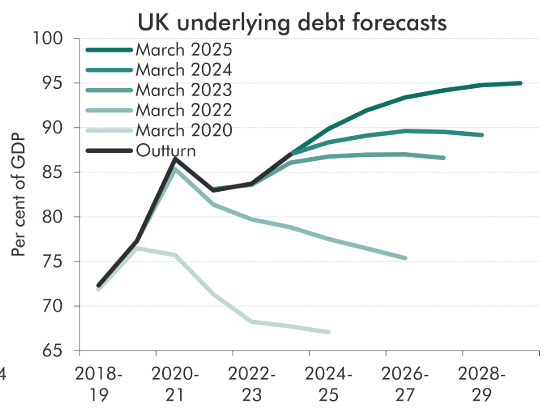
Picture by Kirsty O'Connor / Treasury.
Pound Sterling is likely to move deeper into the 1.15s.
The Pound to Euro exchange rate is expected to stay under pressure in the near term and periods of strength are likely to be brief.
The UK currency came under fresh pressure on Tuesday as UK debt fears resurfaced, with the Office for Budget Responsibility (OBR) issuing its latest risk report that warned the government's debt path is on an unsustainable footing.
Remarkably, the country is on course to have a debt-to-GDP ratio of 270% by 2070, meaning our national debt will be nearly three times the size of the entire economy. This would be triple the current debt burden.
"From the perspective of financial markets, this report suggests that UK bond market volatility will be a regular feature in the coming months and years and may lead to elevated bond yields compared to our global peers. It also suggests that sterling could be at risk from sharp, sudden declines, even if it has remained well supported in recent years," says Kathleen Brooks, Research Director at XTB.
"The U.K. government continues to struggle with fiscal credibility," says Geoff Yu, EMEA Macro Strategist at Bank of New York (BNY). "We believe current positioning in U.K. assets by foreign investors is too benign."
Yu suspects the Pound should have adjusted much lower by now to compensate investors for idiosyncratic risks relating to the UK, but thinks a trigger for such a move is still needed. Such a trigger could be a decision by the Bank of England to accelerate the pace it cuts interest rates, he says.
This spells nervous times for the Pound as we move into the second half of the year, with risks seemingly building.
For now, the Pound-Euro exchange rate decline remains orderly, with the downtrend being a result of growing unease over the UK's economy and national debt, as well as exogenous drivers that includes improving demand for European assets.
Technically, the exchange rate looks to be stuck below 1.16, and a slow descent towards 1.15 now looks the most likely outcome for July:
Above: GBP/EUR at daily intervals with the annotations we made in Monday's Week Ahead Forecast.
Consistent with this technical downtrend, the British Pound has been unable to fully recoup last Wednesday's fall that was triggered by the sight of Rachel Reeves, the Chancellor of the Exchequer, crying in Parliament.
Her tears followed Prime Minister Keir Starmer's u-turn on attempts to reform the benefit system to save some money. Failure to do so, and a visibly shaken Reeves, brought the issue of UK debt dynamics into clear view.
Nearly a week later, the government's spending watchdog, the OBR, said:
"Efforts to put the UK's public finances on a sustainable footing after a series of global shocks have met with only limited and temporary success in recent years, leaving the UK with the sixth-highest debt, fifth-highest deficit, and third-highest borrowing costs among 36 advanced economies."

The UK's debt dynamics are comparatively worse than elsewhere. This means the market will likely test the UK first, causing jitters in Sterling and gilts.
Tax rises are incoming and the domination of the public sector over the private sector will continue, ensuring resources are continually funnelled into a non-productive state at the expense of the UK's entrepreneurs, small businesses and corporations.
Markets are nervous: gilts are rising, meaning investors are demanding greater returns for holding UK debt as compensation for future risks.
The UK bond markets (gilts) are heavily subsidised by foreigners, and foreign inflows are crucial to ensuring the Pound maintains current values.
If the UK loses the confidence of these international investors, both risk falling in a more serious manner. "As I/we keep warning, we are utterly and completely dependent on the kindness of strangers, and their kindness and patience is wearing thin," says Robert Colville, Director at think tank the CPS.
The UK's debt burden is seemingly continually revised higher, defying the fantastical expectation that it will magically fall.
"Yet the public's expectation of what the government can do, and should spend, is completely out of line with fiscal reality," he warns.
Julian Jessop, Economics Fellow at the Institute of Economic Affairs, says the UK government's cost of borrowing is now consistently the highest in the G7, and no sign that public spending is being brought under control.
"Too many subjects are still taboo, such as real reform of the NHS, or unpicking the 'triple lock' on the state pension. Politicians must be more honest with the public about the costs and trade-offs involved - and voters need to be more willing to listen," he says.
A reckoning is coming, but the timing is still up for debate. It's hard to see the Pound thrive under such circumstances.


